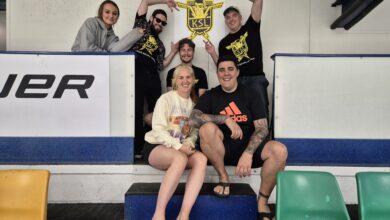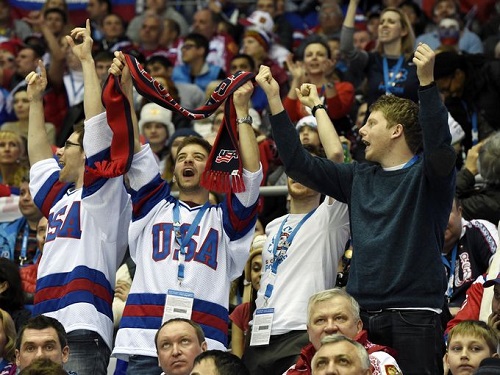
CALL THAT MAN BUTTER, ‘CAUSE HE’S ON A ROLL.
Converting four of his six shootout attempts (aren’t the Olympics a lovely thing?), the St. Louis Blues‘ T.J. Oshie became a household name this Saturday, propelling the United States to overtime victory over familiar foes Russia. The centerman, brought along for his expertise in the skills competition, proved his worth in the tilt; although only deployed for 9:23, the specialist came through when needed, notching the deciding goal in a hard fought 3-2 victory.
Throwing 34 shots at Sergei Bobrovsky, the Americans would find difficulty in solving the former Vezina winner at even strength; firing on all cylinders, the US power play would click for two crucial goals. Following a scoreless first period, 22-year old Cam Fowler-defenseman for the Anaheim Ducks-would strike first for the Yankees, rifling home the puck in a net-front scrum. Sliding the crucial pass, James van Riemsdyk would record the primary assist, with Toronto Maple Leafs‘ cohort Phil Kessel notching the secondary helper.
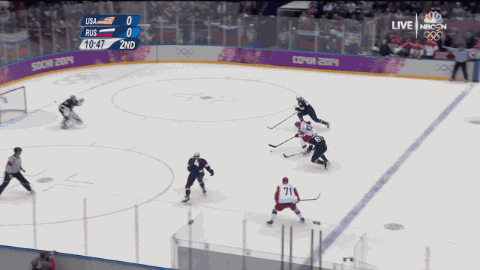
(NBCSN)
Tying the game at one, the score cancelled Pavel Datsyuk’s previous marker, a lovely individual effort that split the American defense and stranded Jonathan Quick in a less than ideal one-on-one situation.
Skating into the third, both teams forced chance after chance on their opponent’s goals, with the Americans shooting eight pucks to the Russians’ seven. Joe Pavelski would come through big at 9:27 of the frame, ripping home blocker side a power play one-timer off of a cross-crease Patrick Kane feed.
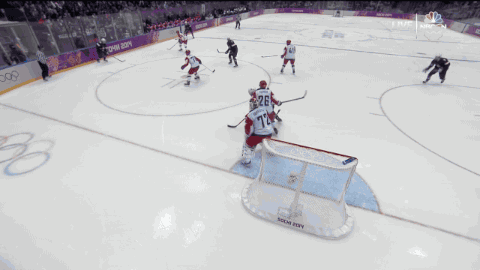
(NBCSN)
Whatever elation the Americans felt, however, would prove to be short-lived; with Dustin Brown serving a kneeing minor, the pesky Datsyuk would hit true a second time, posting his second of the game a mere 3:17 after the USA’s go-ahead shot. Wristing an attempt through traffic, a screened Quick turned helplessly to find the puck lying in his net. 2-2, tie game.
The third period would not end without controversy; immediately afterward, it appeared as though Fedor Tyutin had given Russia a win on home ice, his slap shot from the blue-line lasering past the netminder Quick. Upon review, however, the goal was disallowed; Canada’s Chris Carlson and Germany’s Andre Schrader-goal judges for the contest-decreed the goal illegal, aided to the twine by a high-sticked deflection.
With the United States failing to convert a late power-play opportunity, both squads found themselves embroiled in an overtime struggle which failed to bear any fruit. Five minutes came and went, neither team able to produce a coup de grâce capable of sating the edgy nerves of two global superpowers. Rolling into the shootout, the United States would send its initial trio of Oshie, van Riemsdyk and Pavelski to match Russia’s fearsome troika of Evgeni Malkin, Datsyuk and former New Jersey Devils‘ sniper Ilya Kovalchuk. Oshie would pot the first attempt of the shootout, with Quick stonewalling the skillful Malkin. With Bobrovsky denying the next two American shooters, the pressure fell on Jonathan Quick to deny Kovalchuk, a micro-recreation of the 2012 Stanley Cup Final; this time, though, the Russian bettered his American opposite, forcing extra rounds.
Confident in his player, coach Dan Bylsma would send Oshie out time and time again, and the forward didn’t disappoint; inspite of Datsyuk and Kovalchuk scoring another goal apiece, the pivot would prove too much for Bobrovsky to handle, scoring on three of his five attempts, including the game-winner.
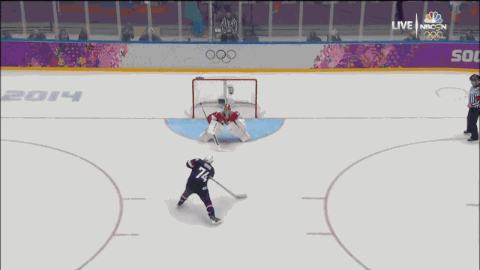
(NBCSN)
Quick would finish the game with a sparkling .936 save percentage. Finding the scoresheet for the Americans in regulation:
- Joe Pavelski (1G)
- James van Riemsdyk (1A)
- Phil Kessel (1A)
- Patrick Kane (1A)
- Cam Fowler (1G)
- Kevin Shattenkirk (1A)
I’ll be funnier next time, I promise!

